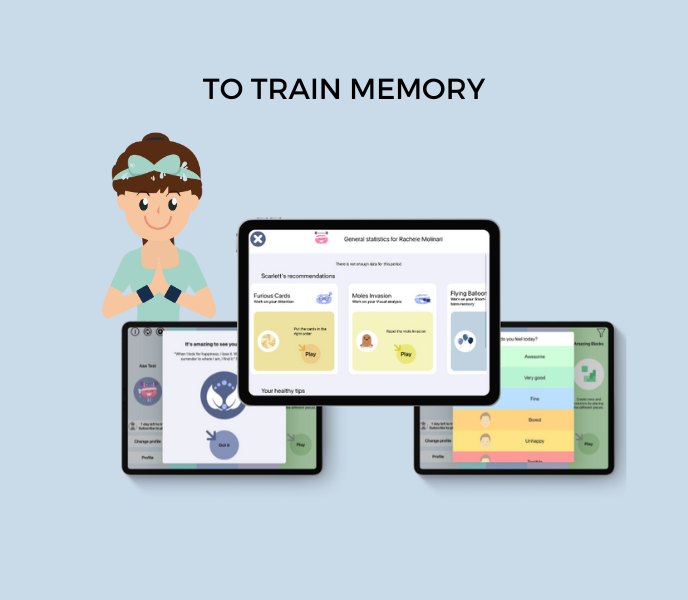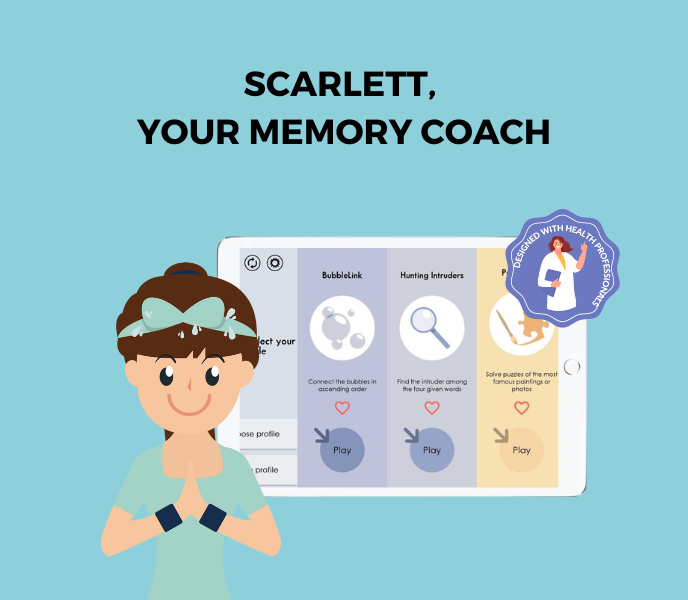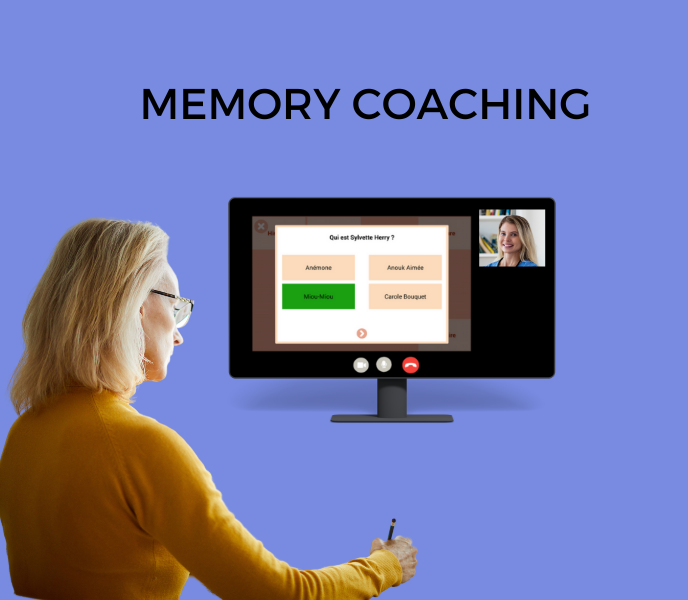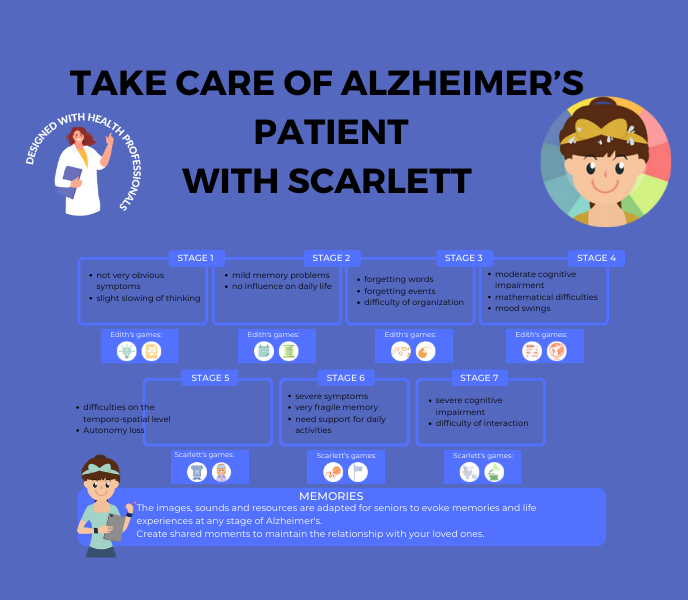Games and alzheimer
Alzheimer’s disease, a progressive neurodegenerative disorder, not only affects the memory and cognitive capacities of sufferers, but also significantly influences their behavior. Caregivers and healthcare professionals are often faced with major challenges, including managing difficult behaviors such as agitation, aggression and wandering. In this context, the adoption of non-medicinal approaches, such as the use of adapted games, is emerging as a promising strategy for improving the quality of life of people with Alzheimer’s. This article explores how games and Alzheimer can not only offer relief from behavioral symptoms, but also enrich the daily lives of these individuals by bringing joy and cognitive stimulation.
I. Understanding Difficult Behaviour in Alzheimer’s Disease
Description of Difficult Behaviors
Challenging behaviours in people with Alzheimer’s can vary considerably from one individual to another, and include manifestations such as agitation, verbal or physical aggression, aimless wandering, mood swings, and constant repetition of questions or phrases. These behaviours not only represent a challenge for caregivers, but also reflect the stress and confusion felt by affected individuals.
Possible causes of these behaviors
Challenging behaviors can be triggered by a variety of factors, including changes in the environment, physical pain or discomfort, frustration at an inability to communicate effectively, or even boredom. Understanding the roots of these behaviors is crucial to developing effective management strategies.
The importance of a non-medication approach
Although medications can be prescribed to manage some of the behavioral symptoms of Alzheimer’s disease, they can also have undesirable side effects. As a result, non-medicinal approaches, such as engaging in playful, stimulating activities, are increasingly favored. These methods offer the advantage of improving overall well-being without the risks associated with pharmacological treatments.
Games, in particular, can play a significant role in mitigating challenging behaviors, providing not only a source of entertainment and enjoyment but also stimulating cognitive and social engagement. The key lies in choosing activities that are adapted to the individual’s interests and abilities, enabling positive, enriching interaction. In the following sections, we’ll explore how different types of games can be integrated into the daily routine of people with Alzheimer’s to effectively manage challenging behaviors and improve their quality of life.
II. The Benefits of Games for People with Alzheimer’s Disease
The use of adapted games offers a series of advantages for people with Alzheimer’s, particularly in managing difficult behaviors. These benefits extend beyond mere entertainment, touching on crucial aspects of cognitive and emotional well-being.
Cognitive and Emotional Benefits of Games
Games designed for Alzheimer’s sufferers can stimulate brain activity and slow cognitive decline. By stimulating memory, attention and problem-solving skills, these playful activities encourage the maintenance of existing brain functions, while providing a sense of accomplishment and pleasure.
Anxiety Reduction and Mood Improvement
Games can also have a significant impact on the emotional state of sufferers. By offering moments of joy and reducing boredom, games lower anxiety levels and promote better emotional management, which can directly influence challenging behaviors.
Strengthening social ties
Participating in group games or family fun activities helps strengthen social ties and combat isolation, a factor known to aggravate behavioral symptoms in Alzheimer’s sufferers.
Examples of games and their impact
Reminiscence Games
Reminiscence-based games, which encourage individuals to recall and share past memories, can be particularly beneficial. They encourage social interaction and can calm agitation by offering a sense of familiarity and security.
Puzzles and Strategy Games
Simple puzzles or games requiring basic planning and strategy can help maintain cognitive engagement. These games stimulate concentration and patience, reducing restlessness and wandering.
Adapted Physical Games
Playful physical activities, such as simple ball games or dance exercises, encourage movement and can help reduce aggression by channeling energy in a positive way.
Selecting the right games
Choosing the right type of game is essential to ensure a positive and beneficial experience. It’s important to consider the stage of the disease, personal preferences, and the individual’s physical and cognitive abilities. The aim is to find games that are both challenging and achievable, to avoid frustration while encouraging active participation.
By integrating adapted games into the daily lives of people with Alzheimer’s, it is possible to manage difficult behaviors more effectively, while improving their overall quality of life. The key lies in choosing personalized activities that meet the specific needs of each individual, offering invaluable support for both sufferers and their caregivers.
IV. Case Studies and Research Around Games and Alzheimer
The use of games as a tool for managing challenging behaviours in people with Alzheimer’s disease is not only based on empirical practice, but also supported by research and case studies. These offer valuable insights into approaches that have proved effective, providing a solid framework for practical application.
Impact of Games on Difficult Behavior
Scientific Research
Studies in geriatrics and cognitive psychology have shown that play activities can significantly reduce symptoms of depression, anxiety and agitation in Alzheimer’s patients. This research underlines the importance of regularly stimulating cognitive and social functions to improve overall well-being.
Mechanism of Action Analysis
The mechanisms by which games positively influence challenging behaviors include improving attention, stimulating memory, increasing social engagement, and providing an outlet for emotional expression. Understanding these mechanisms helps to select the most appropriate games for each individual’s specific needs.
Games and alzheimer
Case Studies
SCARLETT Games Program
A case study on the use of the SCARLETT tablet game program showed a marked improvement in mood and a reduction in wandering among participants after several weeks of regular use. The games, which focused on memory and visual recognition, encouraged cognitive engagement in a safe, stimulating environment.

Games and alzheimer
Reminiscence Workshops
Reminiscence workshops using adapted board games facilitated communication and strengthened family ties. Participants expressed an increased sense of well-being and better temporal orientation, underlining the effectiveness of these games in stimulating long-term memories.
Implications for Care
Practical recommendations
In the light of research and case studies, healthcare professionals are recommending the integration of adapted games into care plans for people with Alzheimer’s disease. The emphasis is on personalized activities, ongoing assessment of preferences and abilities, and the active involvement of families.
Caregiver training
Training caregivers in the use of games to manage challenging behaviors is essential. Training programs should include guidelines for game selection, strategies for encouraging participation, and techniques for evaluating the effectiveness of proposed activities.
Integrating games into the daily routine of people with Alzheimer’s offers a promising approach to improving quality of life and managing challenging behaviors. Case studies and research in this field continue to provide solid evidence of the effectiveness of this method, encouraging its wider adoption in care strategies.
Testimonial 1: Dr. Amélie Fontaine, Geriatrician
“By integrating memory games and puzzles into the care plan of my Alzheimer’s patients, I observed a marked improvement in their mood and a reduction in episodes of agitation. One of my patients, who tended to be very anxious in the late afternoon, became much calmer and more focused after regular sessions of adapted games. These activities not only improved his quality of life but also offered precious moments of joy and connection with his family.”
Testimonial 2: Sophie Bernard, Nurse Specialized in Neurology
“The reminiscence-based games have had a remarkable impact on several of my patients. In particular, one patient who had difficulty engaging in everyday conversations showed a great improvement in her ability to communicate after participating in reminiscence workshops. These sessions enabled her to share memories of her youth, strengthening her sense of identity and reducing her isolation. This shows just how powerful adapted games can be in treating the behavioral symptoms of Alzheimer’s.”
Testimonial 3: Marc Dupont, Occupational Therapist
“Using adapted physical games, such as soft ball games, has been a revelation in my practice. These activities not only encourage movement and exercise, but also help to channel energy in a positive way, reducing aggression in some of my patients. What’s more, the shared fun and laughter during these games enhances social interaction and improves overall well-being. It’s a holistic approach that supports both physical and mental health.”
Testimonial 4: Élodie Rousseau, Clinical Psychologist
“In my work with people with Alzheimer’s, I have found that games and play activities are essential for maintaining cognitive and emotional engagement. One patient in particular, who regularly took part in adapted strategy games, showed a marked improvement in his ability to concentrate and solve problems. These playful activities are not just distractions; they are therapeutic tools that promote cognition and emotional well-being.”
Games and alzheimer
AND FOR FURTHER INFORMATION

SCARLETT PROGRAM, YOUR MEMORY COACH
With the SCARLETT adapted play program, your loved ones will be stimulated at their own pace. The games have no timer, no score, so that seniors can rediscover the pleasure of playing. A practical solution for family and professional caregivers.

REMOTE MEMORY COACHING
OTHER ARTICLES THAT MIGHT INTEREST YOU:
The Role of Cognitive Apps in Speech Therapy for Alzheimer’s Patients
Alzheimer’s disease is a progressive neurological disorder that primarily affects memory, thinking, and behavior. As...
Memory Apps for Alzheimer’s: Enhancing Recall in Speech Therapy Sessions
Alzheimer's disease is a progressive neurological disorder that primarily affects memory, thinking, and behavior. As...
Cognitive Rehabilitation Apps for Speech Therapy with Alzheimer’s Patients
In recent years, the landscape of cognitive rehabilitation has evolved significantly, largely due to the advent of...








